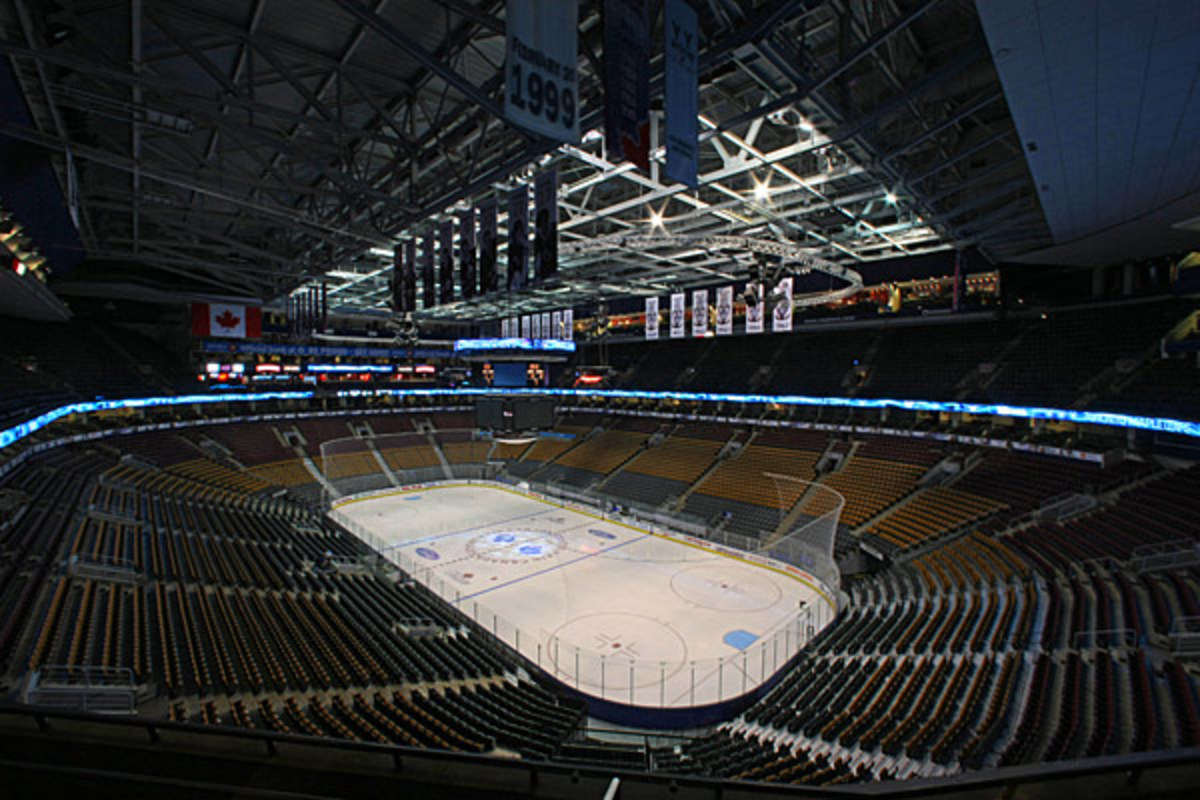Sale of Maple Leafs creates Canadian media colossus
Air Canada Centre, home of the Maple Leafs and the NBA's Raptors, is just one piece of a $1.3 billion transaction, the largest in North American sports history. (Photo by Tom Szczerbowski/US PRESSWIRE)
By Stu Hackel
With much talk about content and iconic brands, Maple Leaf Sports and Entertainment (MLSE) was sold today by its longtime majority shareholder, the Ontario Teachers Pension Plan (or "Teachers," as it is commonly called), to a partnership formed by two competing media conglomerates, Bell Canada/BCE Inc. and Rogers Communications, and the current minority owner, Larry Tanenbaum.
Just how this will impact the Maple Leafs, the NHL's most profitable club and crown jewel of the empire, as well as the other MLSE clubs -- the NBA's Raptors, the MLS Toronto FC, and the AHL's Marlies -- is an open question. There is much skepticism in Toronto that the new ownership of the Maple Leafs' parent company will translate into a championship. More than one observer noted that there was hardly a mention of the Stanley Cup during today's press conference announcing the billion dollar-plus transaction.
The Leafs are finally enjoying a good first half of the season, but their years of stumbling around in mid and low levels of the standings were often attributed to Teachers' passive, profit-driven role in the operation.
Will the new partners be more active than the pension plan that reaped a healthy annual return from MLSE? They could potentially end up being more involved, if only because a stronger NHL team will greatly increase the consumption of Leafs' content on the new owners' various TV, radio, internet and mobile phone platforms. The pension plan's board of directors had no similar motivation.
But the two media giants seemed more focused today on discussing those platforms than the rinks, courts or fields on which the MLSE teams play.
With Tanenbaum remaining in charge of the operation as chairman of MLSE, little may change in the Maple Leafs' front office or those of the other MLSE teams. “We are extremely pleased with Larry Tanenbaum and his management team,” Rogers president Nadir Mohammed said at the joint press conference Friday morning. Further questioning by reporters on how the Leafs and the other MLSE teams might change elicited only vague and enthusiastic answers about how huge the brands and happy the new owners are. They seemed content to let Tanenbaum and Brian Burke, the Leafs president and GM, run the show for the NHL club, and concern themselves with churning out programming and profiting from it.
So, it's status quo for now. The Toronto Star expressed its city's frustration in an editorial, acknowledging that studies have shown that "Toronto fans pay the most and get the least. Big population, lots of corporate head offices, rabid hockey fans, faithful baseball followers and a fast-growing basketball nation -- it all means loads of revenue for teams that lose and lose again. ESPN struck a nerve last summer by identifying Toronto as the North American city where fans get the least bang for the buck."
The Star worried that the deal "means extracting more revenue from more and more fans," and went on to say, "To break the cycle, Toronto needs winning teams, and owners dedicated to making it happen....What fans don’t want is more success at the cash register — and ever more failure where it really counts."
Teachers received CDN $1.32-billion for its 79.53 percent share and Tanenbaum, who had owned the remaining 20.47 percent, upped his stake to 25 percent and will remain MLSE chairman and the Leafs' governor. The protracted negotiation between the media giants and Teachers was brokered by Tanenbaum, who had right of first refusal on Teachers' share of MLSE.
The fate of the Maple Leafs is not the only concern for this new group. If ever there was a sports monopoly, this looks to be it. In addition to the four teams, MLSE also owns the Air Canada Centre and has two of its own TV networks, Leafs TV and Raptors TV, plus real estate and restaurant holdings near the ACC. Among their individual properties, Rogers owns Major League Baseball's Toronto Blue Jays and their domed ballpark, the Rogers Centre, while Bell has a piece of the Montreal Canadiens.
Just how the partnership will allowed to have a share of two rival NHL teams remains to be seen, although Bell CEO George Cope told a press conference today that his company intends to hold onto its share of the Canadiens and will work with the NHL “to resolve issues as they arise.” He added that Canadiens president Geoff Molson had issued a statement voicing a similar sentiment.
Bell owns the CTV broadcast network, national cable sports network TSN and its related platforms. Rogers owns the SportsNet regional cable channels and related properties. Each hold different shares of the Maple Leafs' overall TV package apart from the games that are shown on CBC's Hockey Night in Canada. They both own Canada's biggest cable TV systems. Bell, Rogers and Calgary-based Shaw Communications collectively control more than 75 percent of English-language television content in Canada.
Canada's Financial Post reported that shortly after the deal was announced, the Competition Bureau of Canada declared that it would review the transaction. A spokesperson for the Ottawa-based watchdog said it was part of the bureau’s mandate to determine if the deal will “result in a substantial lessening or prevention of competition.”
The Toronto Star noted that the Bureau's new head, Melanie Aitken, has challenged both Rogers and Bell before on certain business practices.
Financial analysts seem uncertain whether Bell and Rogers will see a huge return on their huge investment. That matters little to Leafs fans. The only return they want is that of the Stanley Cup, something that seemed an afterthought, at best, to the new owners.

































